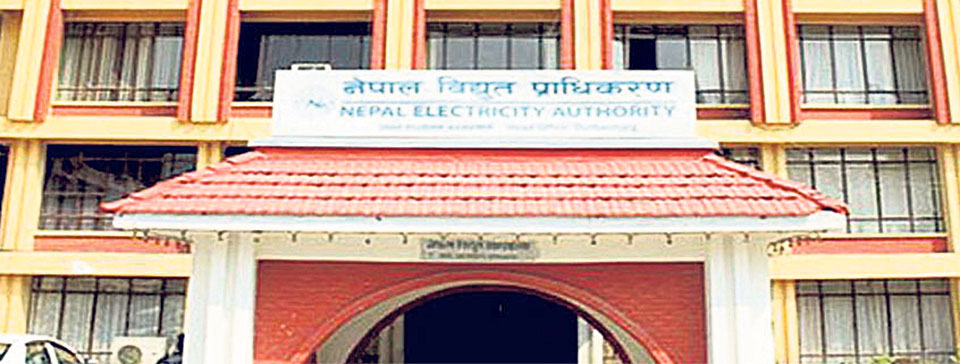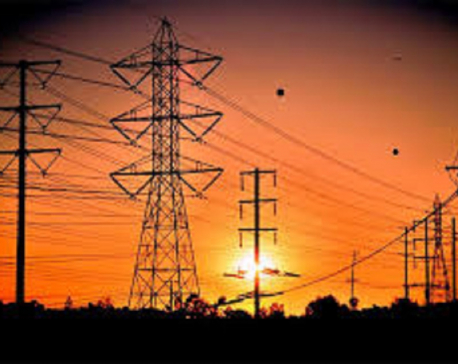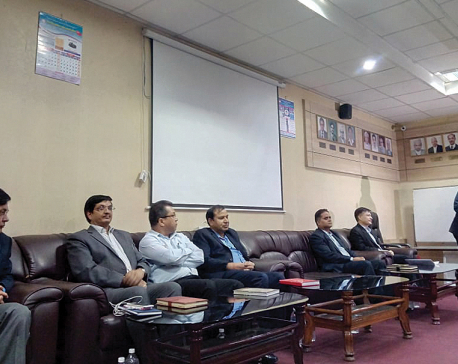
OR
Impact of lockdown
NEA losing Rs 1.8 billion per month as energy consumption
Published On: April 9, 2020 10:21 AM NPT By: Muna Sunuwar | @TheMunaSun

KATHMANDU, April 9: The halt in industrial activities in the country due to the ongoing lockdown is expected to cause Nepal Electricity Authority (NEA) a monthly loss of around Rs 2 billion.
With only essential services in operation, monthly energy consumption has fallen by 6 million units causing revenue loss of Rs 1.8 million a month to the utility, according to an official of the NEA. “Our daily demand has fallen to 14,000 megawatt/hour (mwh) compared to 20,000-22,000 mwh on a normal day. Daily demand for energy has fallen by 6,000 mwh which is about 6 million units,” Prabal Adhikari, the spokesperson for the NEA, told Republica. “We are staring at a monthly revenue loss of Rs 1.8 billion.”
The demand for energy has shrunk as hotels, corporate, offices, factories and industrial enterprises have remained shut since the government enforced nationwide lockdown. According to the NEA, the daily demand for electricity has fallen to 650-700 MW during daytime and 450-500 MW in nighttime. Average daily demand stood at 1,200 MW before the lockdown was enforced.
The demand in Kathmandu Valley – the largest consumer of electricity in the country – has plummeted to 288 MW per day compared to 400 MW on a normal day.
“Not only the halt in industrial activities, migration of household consumers to their respective villages is also energy consumption to fall,” Adhikari added.
The government has appealed to the people to pay electricity bills online until the risk of the spread of COVID-19 subsides. NEA had expected to collect one-sixth of its revenue from online platforms. But the response toward online platforms has been underwhelming, according to Adhikari. “We had expected to collect around Rs 1 billion through online platforms this month. But it didn't happen,” Adhikari said, adding: “It might be because the government has announced exemption of delay penalty due to the current crisis. Also, many people are not Internet literate and lack access to payment gateways.”
He added that people might have chosen to invest their money to buy daily essentials instead of paying utility bills.
With demand for energy declining, the NEA has reduced power imports from India. The state-owned utility is importing only 120 MW of electricity via Dhalkebar-Muzaffarpur transmission during normal hours. “An additional 70 MW electricity is being imported during peak hours,” said Adhikari. “We are also importing 10 MW of electricity from Tanakpur.”
You May Like This

Anxiety of surplus electricity
It’s a bare fact that our hydropower projects are spilling during off-peak hours from May to November and it is... Read More...

Entrepreneurs of Rupandehi warn of protests
BUTWAL, Feb 29: Entrepreneurs of Rupandehi have warned of protest after the Nepal Electricity Authority (NEA) issued a 35-day notice... Read More...

NEA tells landlords not to charge tenants arbitrarily
KATHMANDU, Sept 16: Nepal Electricity Authority (NEA) has announced that landlords cannot charge their tenants higher tariff on electricity than... Read More...




Just In
- CM Kandel requests Finance Minister Pun to put Karnali province in priority in upcoming budget
- Australia reduces TR visa age limit and duration as it implements stricter regulations for foreign students
- Govt aims to surpass Rs 10 trillion GDP mark in next five years
- Govt appoints 77 Liaison Officers for mountain climbing management for spring season
- EC decides to permit public vehicles to operate freely on day of by-election
- Fugitive arrested after 26 years
- Indian Potash Ltd secures contract to bring 30,000 tons of urea within 107 days
- CAN adds four players to squad for T20 series against West Indies 'A'














Leave A Comment